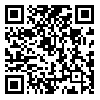Volume 11, Issue 45 (12-2022)
erj 2022, __(45): 147-163 |
Back to browse issues page
Download citation:
BibTeX | RIS | EndNote | Medlars | ProCite | Reference Manager | RefWorks
Send citation to:



BibTeX | RIS | EndNote | Medlars | ProCite | Reference Manager | RefWorks
Send citation to:
Hamidi F, Otoufati Roudi M. Predicting teachers' self-efficacy based on cognitive flexibility function and teaching-learning concepts in inclusive education-based classes. erj 2022; 11 (45) :147-163
URL: http://erj.khu.ac.ir/article-1-1201-en.html
URL: http://erj.khu.ac.ir/article-1-1201-en.html
1- Shahid Rajaee Teacher Training University , fhamidi@sru.ac.ir
2- Shahid Rajaee Teacher Training University
2- Shahid Rajaee Teacher Training University
Abstract: (9558 Views)
In the classrooms based on inclusive education, cognitive flexibility and teaching-learning concepts play an important role in teachers' self-efficacy. The aim of this study was to investigate the role of cognitive flexibility and teaching-learning concepts in teachers' self-efficacy in a classroom based on inclusive education. The research method was descriptive and correlational. Sampling was done by a simple random method from the list of names of teachers participating in inclusive education. Therefore, 467 primary teachers of the 9th district of Mashhad were selected. In order to collect data, teachers' self-efficacy questionnaires in inclusive education (TEIP, Sharma et al., 2012), cognitive flexibility questionnaire (CFI, Dennis and Vanderwaal, 2010) and the teaching-learning concepts questionnaire TLCQ (Chan Elwitt, 2004) was used. Pearson's correlation coefficient and multiple linear regression analysis were used to analyze data. Results showed that there is a positive and significant correlation between cognitive flexibility and the perception of self-efficacy related to inclusive education, as well as the concepts of constructivist learning and the perception of self-efficacy related to inclusive education (P < 0.01). Also, the results of multiple regression analysis showed the variables of cognitive flexibility and constructivist learning teaching concepts predict 36% of the total variance of teachers' self-efficacy. In general, teachers with cognitive flexibility and more developed teaching-learning concepts experience higher self-efficacy in classrooms based on inclusive education. The findings of this research emphasize the development of cognitive flexibility and teaching-learning concepts to improve the self-efficacy of teachers in the classroom based on inclusive education.
Type of Study: Research Paper |
Subject:
Educational Psychology
Received: 2022/06/7 | Revised: 2023/11/21 | Accepted: 2023/05/21 | ePublished: 2023/11/11
Received: 2022/06/7 | Revised: 2023/11/21 | Accepted: 2023/05/21 | ePublished: 2023/11/11
Send email to the article author
| Rights and permissions | |
 |
This work is licensed under a Creative Commons Attribution-NonCommercial 4.0 International License. |





